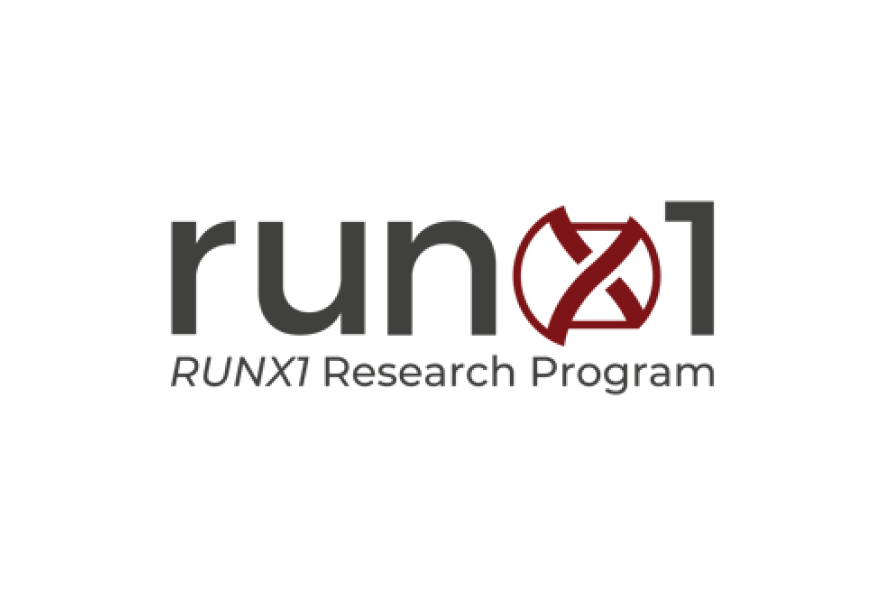RUNX1 Research Program
Patient-Partnered Collaboration
RUNX1-FPD (also known as RUNX1-FPDMM or FPD-AML) is a rare inherited disease caused by a mutation in the RUNX1 gene, resulting in lower blood platelet counts, platelet dysfunction, and an increased risk of early-onset blood cancers. Individuals with this disease primarily develop acute myeloid leukemia (AML), the second deadliest blood cancer. RUNX1-FPD patients often face a range of health issues including asthma, allergies, autoimmune disorders and gastrointestinal problems.
Last updated 04/30/2025
Clinical
Disease Class
Hematological diseases
Body Systems
Digestive
Hematopoietic / Lymphatic / Immune
Integumentary / Exocrine
Respiratory
Organs
Blood
Bone marrow
Connective tissue / joints
Intestines
Skin
Known Genetic Link
Yes, one or more genes directly cause the condition
causative_genes
RUNX1
contributory_genes
BCOR
DNMT3A
FLT3
PHF6
TET2
Type of Inheritance
Autosomal dominant
De novo
Newborn Screening
No
Disease Mechanism(s)
Aberrant immune response
Abnormal cell proliferation
Altered DNA repair mechanism
Autoimmune
Autoinflammatory disorder
Pathogenic mutation
mTOR pathways dysregulation
Age of Onset
Infancy (age 0-1)
Average Age at Diagnosis
Adolescence (12-17)
Life Expectancy
Adulthood (age 18-64)
Affected Sex(es)
Female
Intersex
Male
National Prevalence
10000+
Global Prevalence
Unknown
National Incidence
Unknown
Global Incidence
Unknown
Symptoms / Phenotypes
allergic rhinitis
asthma
bruising susceptibility
cancer, leukemia
colitis
conjunctivitis
hemorrhage/bleeding
joint pain / arthralgia
myelodysplasia
Sjogren's Syndrome
skin redness and/or swelling
Biomarkers
Diagnostic
· Genetic testing for pathogenic RUNX1 variants ranging from single nucleotide changes to whole gene deletions.
Monitoring
· Bone marrow NGS monitoring using a myeloid malignancy panel, depending on age and risk factors BMB’s often occur annually
Prognostic
· No validated biomarkers but physicians use somatic mutation acquisition as a sign of progression and depending on the affected gene as a proxy for aggressiveness based on sporadic myeloid malignancy data.
Existing Therapies
Off-Label Drug Use
Other
· At time of hematologic malignancy a hematopoietic stem cell transplant is almost always required
Organizational & Research
Cell Lines
CD34 cells
iPSCs
LCLs
Cell Lines, Institution
Boston Children's Hospital
Mt. Sinai
NIH
Oregon Health and Sciences University (OHSU)
Stanford University
University of Pennsylvania (PENN)
Cell Lines, Involvement
Consulted
Funded
Cell Lines, share
All our cell lines are freely available
Disease Model
Mouse
Organoids
Zebrafish
Disease Model, Involvement
Funded
Disease Model, share
All our disease models are freely available
Clinical Trial Role
Data sharing
Focus group
Funding
Recruitment and outreach, patients
Recruitment and outreach, trial sites/physicians
Results dissemination, publication
Study material design, review (not protocol)
Study protocol design, review
Travel coordination
Biobank, Institution
University of Pennsylvania (PENN)
Biobank, Involvement
Funded
Center of Excellence, Institution
None
Registry
Yes, we have a registry that we created
Data Collected, Registry
Genetic data
Longitudinal natural history data
Medication usage
Patient contact info
Patient-reported data
Data Entered by, Registry
Patients
Platform, Registry
Other
Natural History Study
Yes, we have collaborated on a natural history study
Data Collected, Natural History Study
Clinical endpoints (outcomes)
Electronic health records/electronic medical records
Genetic data
Medication usage
Patient-reported outcomes
Prospective data
Retrospective data
Platform, Natural History Study
REDCap
FDA Patient Listening Session
No
FDA Patient-Focused Drug Development (PFDD) Program
No
ICD Codes
No, we do not have any ICD codes
Diagnostic Guidelines
Yes, we have guidance available on our website
Science Advisory Board Policies
Yes, willing to share SAB policies
Research Network Policies
Does not have a CRN
Research Roadmap
Yes we have a Research Roadmap, and will share policies
International Chapters
None
International Partners
None
